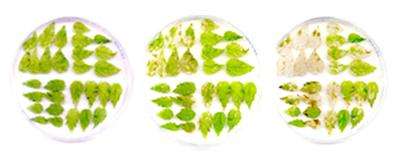Improvements in the thermotolerance of a tree species

Is it possible to improve tolerance of trees to high temperatures and other types of stress derived of climate change? A research group of the Universidad Politécnica de Madrid (UPM), led by Luis Gómez, a professor of the Forestry School and the Centre for Plant Biotechnology and Genomics (CBGP), is studying the tolerance of trees using molecular and biotechnological tools. The research work was published in the last issue of Plant Physiology journal, the most cited scientific journal in the world of plants.
The obtained poplars in this project, with the collaboration of the Universidad de Málaga, are significantly more tolerant to high temperatures than the control tree. These trees are also more tolerant to drought, to the presence of weed-killer, to in vitro and ex vitro crops, to contamination and other ways of abiotic stress that have an applied interest for forestry. This work is a continuation of a project started by of a research team of the UPM a decade ago. This study focuses on mechanisms that plant cells use to protect themselves from stress factors.
This research group has funding from the National R&D Plan, the Activity Program of the Research Groups from the Community of Madrid (2) and the LIFE+ Programme (3) of the European Union. The "On the side" section of Plant Physiology Journal has highlighted these results as well as its application in the forestry sector. The poplar plantation is having a growing boom thanks to its advantages to produce biomass with energetic purposes.
Due to the human pressure on forests, the Food and Agriculture Organization of the United Nations (FAO) is promoting intensive plantations as an alternative to meet the global demand of wood and other products. Besides, plantations have social and economic benefits (job creation, wealth and rural development). This model change has significant ecological consequences.
The role of forests is essential for climate change mitigation and biodiversity preservation, amongst others. A documentary "El Bosque Protector", co-produced by the UPM and available on "A la Carta" of RTVE shows the result of this study. Tree farming plantations as a realistic alternative will be possible if the current yield significantly increases. But, global warming hinders this goal due to the losses in the agricultural sector for the last decade. Besides, a recent multidisciplinary study published in Nature Climate Change journal reveals that global warming is also accelerating deforestation of the planet.
"The genetic and biochemistry complexity of the tolerance mechanisms to high temperatures has hindered positive results so far", said Luis Gómez. "Our work confirms that it is possible to obtain positive results if we focus on fundamental protective mechanisms which are present in living beings. They are so fundamental that the obtained poplars in this work can resist other stress factors".Due to economic losses associated to these factors, this work of the researchers of UPM can contribute to increase yields and, consequently to mitigate the current pressure on forests.
More information: "Plantation forestry under global warming: Hybrid poplars with improved thermotolerance provide new insights on the in vivo function of small heat shock protein chaperones". Plant Physiology 164: 978–991. DOI: 10.1104/pp.113.
Journal information: Nature Climate Change
Provided by Universidad Politécnica de Madrid



















